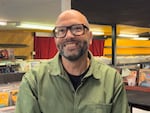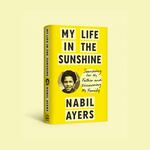
Music industry entrepreneur Nabil Ayers hosts a DJ set at Portland's Music Millennium on Oct. 14, 2022.
Prakruti Bhatt / OPB
When music industry entrepreneur Nabil Ayers enters Portland’s Music Millennium, it feels like a child has entered their favorite candy store. There’s the same sense of excitement in his eyes, an eagerness to move from one aisle to another looking for treats, curious to see what’s new. Ayers was in Portland on Oct. 14 as part of his nationwide book tour for his memoir, “My Life in the Sunshine: Searching for my Father and Discovering my Family.” But before his talk at Powell’s City of Books downtown, he budgeted extra time to leisurely peruse the iconic record store. He even DJed for a bit on the upper level.
In his book, Ayers writes about his struggles with identity growing up as a mixed race child while navigating a complicated relationship with his father, critically acclaimed musician Roy Ayers. The author riffled through Music Millennium’s vinyl bins with OPB’s Prakruti Bhatt while chatting about his new book, his dad and his connection to his father’s song, “Everybody Loves the Sunshine.”
Below are excerpts from the interview:
Prakruti Bhatt: “My Life in the Sunshine: Searching for my Father and Discovering my Family” feels like an important dialog on identity. Throughout your book, you mention these little moments of internal conflict when it comes to [getting] to a resolution. Do you still face that and if so, how do you come to a resolution?
Nabil Ayers: Yeah, the identity question is a big one. It’s something I sort of struggle with throughout the book and have struggled with throughout my life. Not struggling with it, but it has never had a definite sense. My father is black, my mother is white. I grew up in a really diverse and mixed surrounding as a kid, which felt totally normal to me and then moved a lot as an adult and less mixed places. And I just never totally felt like I fit in in any race. I consider myself biracial, and to me, that’s fine. But I think a lot of people want me to make a choice or to just sort of claim an identity or they want to ask about it and they want to talk about it. And I’m happy to talk about it, but it’s still really hard for me to sort of say what I am because I don’t feel it.
Bhatt: You also have this complex relationship with your father that you talk about in the book. And you reach this climatic moment towards the end where you say, what do I want from him? What do you want? And have you arrived at a conclusion?
Ayers: That’s a good question. The quick background is that my mother, when she was really young, decided she wanted to be a young single mother. She was kind of dating my father and said to him, “I want to have a child. I want you to be the father. You don’t have to be involved.” She was 21 when she did this, and then he said yes. I’ve always known this story.
So he was never missing. They didn’t get divorced. He didn’t leave us. There was none of the sort of traditional missing father things. And I had my uncle. I had incredible male role models and had a really wonderful childhood and a great life. My mother was incredible and did a great job. So of course there are issues, but it’s not the sort of traditional set of issues of a missing father. But as I got older in my 30s, I decided I did want to maybe try to meet him and learn more and learn more about family history and health history and technical things like that. Once, I was able to have lunch with him and it was great and really interesting and we really connected.
At that point, I kind of hoped that could maybe continue to happen. We’d have lunch once a year or something like that, but then he just kind of obviously wasn’t interested. And that’s really the first time in my life I started to kind of feel some anger and some resentment towards him because it was the first time I asked for something and not gotten it.
So in the book, I do ask the question where I’m kind of still trying to get a hold of him, trying to make plans, and I sort of stop and think, “Huh, what do I actually want from him?” That’s really the question. And figuring that out on my own without his involvement – it’s kind of what I ended up doing.
I just realized I don’t need him as much as I thought I did. I did 23andMe and really kind of went around him and found all these other interesting relatives who I’m really close with, who have been so helpful with giving me so much information and who really feel like family. So I’m still not in touch with my father, but in a way, because of him, I’m in touch with all these other people.

This photo, which was obtained from Grandstand Media, shows Nabil Ayers' memoir, "My Life in the Sunshine: Searching for My Father and Discovering My Family."
Courtesy of Grandstand Media
Bhatt: Thank you for sharing that. On that note, how has your personal relationship with “Everybody Loves the Sunshine” evolved through the years?
Ayers: So my father’s song, “Everybody Loves the Sunshine,” came out in 1976 when I was a kid. I’ve always loved that song, that album. I’ve always known it. I’ve always known that’s my father. I’ve seen him play it live before. I’ve heard it in movies and TV shows and commercials. But once I kind of tried to get a hold of him and sort of felt like he wasn’t really paying attention or wasn’t interested, that was the first time that his music also was kind of like, “Hum, maybe I don’t like his music as much as I thought he did.”
And that’s a really interesting thing that I write about in the book. When I saw him one year the day that we got lunch together, it was great and I loved the show. It was so good. But when I saw him a year later, when he kind of wouldn’t make plans with me at the show, I really didn’t like that show. And I thought he played “Everybody Loves the Sunshine” too fast and there were things I didn’t like about it. And it was a friend of mine who said, “It sounds like maybe you’re talking about your father more than you are the actual song or the concert.” So I do think there’s a sort of parallel with how I feel about his music and how I feel about him.
But ultimately now, I’m in a really good place and I’ve discovered all this new family and I walked down the aisle to “Everybody Loves the Sunshine” four years ago when my wife and I got married. I love that song and am very happy to hear it.
Bhatt: In the book, you write about a moment where you went up with your first band and you say that the nervous energy you were feeling faded because the people, the audience, were already wanting to love you guys. And I’m just wondering in today’s context, how has that changed? I understand that there’s a lot of pressure from the internet and now, you have labels pushing artists to take up TikTok challenges. Would you have any thoughts on that kind of parallel?
Ayers: Wow. That’s a really interesting question that definitely no one’s even pointed out. That scene, which is one of my favorite memories, I was in my first real high school band where kids could actually play instruments. We knew some songs and we played at a party. I was probably 14 and I was so, so nervous. And there were 50 kids there. We sat down, and were getting ready to set up. But the feeling was you could just tell everyone there wanted to like us. They were our friends. They were excited. It was like, “Wow, our friends’ bands are going to play like this.” I would imagine that’s what it feels like to be on the football team and have everybody rooting for you. So it’s a really good feeling. The show was great and it was even more fun than I hoped it would be.
I would love to think that still now, with technology and TikTok and all of the things that exist, those kinds of moments can still happen. I mean, now they can just be captured and be shared and maybe they’re less impactful because we really have to be there to experience them that way. But I hope that there are still kids doing exactly that tonight here in Portland – playing a show for the first time and their friends are excited. I don’t think that’s changed.
